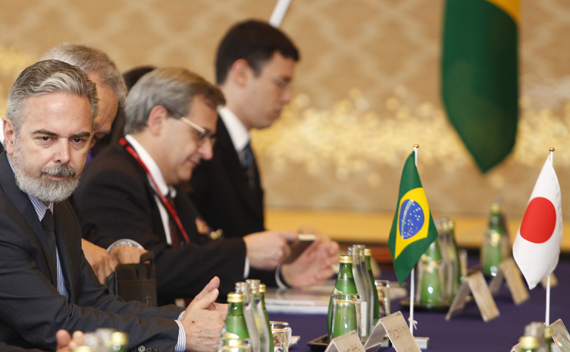Security Council Reform in Sight?
July 7, 2011 5:18 pm (EST)
- Post
- Blog posts represent the views of CFR fellows and staff and not those of CFR, which takes no institutional positions.
More on:

After years of inertia, the campaign for UN Security Council (UNSC) enlargement is gathering momentum. The four main aspirants to new permanent seats—the so-called “G4” countries of India, Germany, Japan, and Brazil—have agreed on a draft resolution to expand both the permanent and elected UNSC membership. Last week Brazil and Japan claimed that the G4 blueprint enjoyed the support of at least one hundred nations. That brings the G4 within striking distance of the magic number: 128 affirmative votes, representing the necessary two-thirds majority in the 192-member UN General Assembly (UNGA). Sources close to the issue tell me that the G4 hopes to submit their resolution for a formal UNGA vote during the current, 65th Assembly session—meaning this summer. But they will only do so if they are confident they can marshal the requisite votes.
Clearing that hurdle will not be easy. The kingmaker remains the African bloc, whose members are locked into the unrealistic “Ezulwini Consensus.” Noting the historic under-representation of Africa on the UNSC, that position insists on two permanent members from the continent, with vetoes, and an additional three elected UNSC members from Africa. Given the diehard opposition of all five permanent members (P5) to any extension of the veto, the consensus is a complete non-starter—and an obstacle to progress on UNSC reform. Fortunately, the AU may not be as united as it appears. It is beginning to dawn on South Africa and Nigeria—the two main African aspirants—that they will never attain their goal without greater flexibility.
The G4 are taking steps to curry favor among African and other developing countries that hold the future in the balance. In June, Foreign Policy’s David Bosco speculated that Brazilian and Indian resistance to a UNSC condemnation of Syria could be an attempt to cobble together “a critical mass” of support within the UN General Assembly:
“They may then gamble, probably correctly, that Washington, Paris, and London would swallow their growing discomfort rather than block their candidacies.”
And former Brazilian president Lula campaigned for the Brazilian membership at the 17th summit of the African Union last week. He cited the Libya mission, playing to African doubts over the wisdom of international intervention there, saying “we need a reformed Security Council, open to new permanent members.” Last week, Japan’s foreign minister met with his Brazilian counterpart, who declared that a draft for Security Council reform is “making the rounds.”
While the G4 is driving this train, the positions of the P5 countries—which will ultimately need to ratify any reform proposal—remain vital. France and Britain are most outspoken in advocating enlargement, recognizing their growing vulnerability as power shifts to new centers—and hoping to forestall calls to combine their seats into a single EU one. Russia, of course, has traditionally opposed adding permanent members, determined to preserve one of its few remaining superpower prerogatives. Still, President Medvedev endorsed India’s bid last December and would be unlikely to oppose an enlargement package supported by two thirds of the UNGA and the other members of the P5.
That leaves China and the United States. Beijing, dead set against additional permanent members, is waging a furious if quiet diplomatic campaign with African nations to ensure the Ezulwini Consensus holds. The Chinese have no desire to see their historical enemy Japan and emerging rival India take their places on the UNSC. Their position on enlargement is virtually indistinguishable from that of the “Uniting for Consensus” group that opposes G4 aspirations and instead advocates for ten additional rotating members (largely from the developing world) and no new permanent members.
The United States, meanwhile, is stuck in neutral. Last November, President Obama surprised and delighted his hosts in New Delhi by pledging U.S. support for India’s eventual permanent membership. Eight months later, there has been no follow-up to that announcement (or to the reaffirmation, several days after the Indian announcement, of traditional U.S. support for Japan’s candidacy).
For the G4 nations, nothing would be more valuable at this pivotal juncture than a strong statement of U.S. support for expanding the UNSC’s permanent membership. Such a step would also be strongly in U.S. interests.
As I argued last December in a Council Special Report co-authored with CFR international affairs fellow Kara C. McDonald, the long-term credibility and legitimacy of the UNSC depends on whether it can draw on the resources and political backing of the world’s most powerful countries. As power shifts, so too must the UNSC’s permanent membership. At the same time, President Obama must make clear that any new permanent member must be willing to accept the weighty responsibilities—and not just the privileges—of membership. Washington will be looking for signals from India and Brazil on this count, in particular. Non-intervention and non-alignment may be good strategies for courting votes in the UNGA, but as permanent members, both countries would need to accept global obligations—including a willingness to use the coercive tools available to the UNSC, when appropriate.
More on:
 Online Store
Online Store
